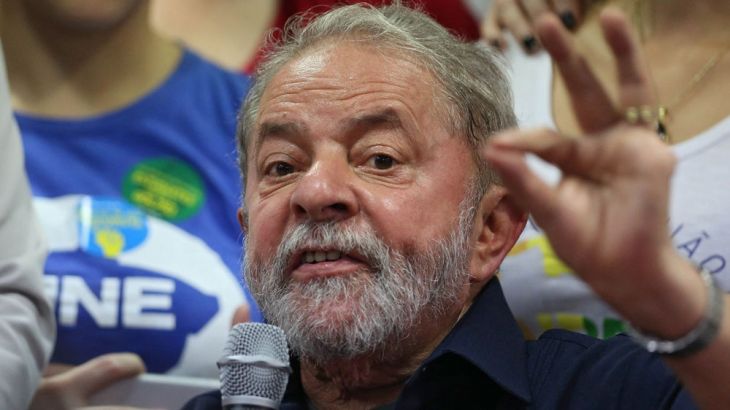Workers’ Party names imprisoned Lula as presidential candidate
Lula, a 72-year-old former president, is currently serving a 12-year prison sentence for corruption.

The leftist Workers’ Party in Brazil has nominated its founder Luiz Inacio “Lula” da Silva as its candidate for the country’s top seat, despite him being imprisoned for corruption.
Brazil is holding a presidential election on October 7.
Keep reading
list of 4 itemsThe Take: What would a third Modi term mean for India?
Full jury panel seated on third day of Trump’s New York hush-money trial
Jacob Zuma’s nine lives: How South Africa’s ex-president keeps coming back
Lula, who is serving a 12-year sentence, is by far the frontrunner in opinion polls but it is still unclear whether he will be able to contest the polls.
The former president, who served two largely popular terms between 2003 and 2010, has been jailed on a corruption conviction. The 72-year-old denies any wrongdoing and claims he is being politically persecuted.
In the Sao Paulo convention centre, some 2,000 attendees donned Lula masks and chanted his name. Following fiery speeches from Lula’s senior allies, the party faithful heard the leader’s words, which were read out by an actor.
“Brazil needs to restore its democracy,” the message said.
“They want to scrap the people’s right to choose the president,” it added. “They want to create a democracy without the people. We have an enormous responsibility ahead.”
One supporter, Paulo Henrique Barbosa Mateus, 27, said the Workers’ Party is confident it can somehow get Lula, who is behind bars in Curitiba, in the race.
“We’ve got even stronger. Our role is to reinforce his candidacy and make sure he gets his right to be in the campaign, because he is innocent,” he told the AFP news agency.
Surveys show him with nearly double the support of all other main candidates in a first round, crushing any runner-up in the second decisive round two weeks later.
Passing the torch
Lula is waiting for final court judgment on whether he can run. But things do not look good: under current laws, anyone losing an appeal of a criminal conviction is not permitted on the ballot.
“His legal team is fighting against the legal team of those who put him in prison in the first place,” said Al Jazeera’s Daniel Schweimler, reporting from the convention in Sao Paulo.
“But even if he gets out – and that’s a remote possibility – it’s still not clear whether he is, in fact, eligible to stand in those October elections.
“That still has to be decided by an electoral court so there’s still a long process to go but the people who selected him as their candidate at the convention here in Sao Paolo are absolutely convinced he is the man for the job.”
Despite the leftist leader’s almost cult-like support, there was close attention being paid to the Workers’ Party choice for vice president – a figure who could end up standing in for the imprisoned leader.
One high-profile possibility is former Sao Paulo mayor Fernando Haddad. A powerful politician, he has signed on to Lula’s legal team, giving him easy access to the prison, and he would be well placed to inherit Lula’s electorate.
But the party appears to be torn, with some fearful of any move that might suggest giving up on the main goal of somehow getting Lula back into the presidential palace. Despite expectations that the issue might be resolved at the convention, no announcement was made.
Other nominees named
Two other big party conventions were held on Saturday.
In Brasilia, centre-left environmental campaigner Marina Silva was named as the nominee of her Rede party.
Also in the capital, former Sao Paulo governor and establishment heavyweight Geraldo Alckmin secured the nod from the centre-right Brazilian Social Democratic Party, or PSDB.
“Go Brazil, Geraldo for president!” about 1,000 supporters chanted before Alckmin, 65, was nominated in an almost unanimous vote.
The problem facing all candidates is the level of voter disgust and apathy.
Two polls show that 33 or 41 percent of voters are undecided or not participating in an election that does not include Lula.
If Lula were on the ballot, that number would drop but still account for about a quarter of voters.